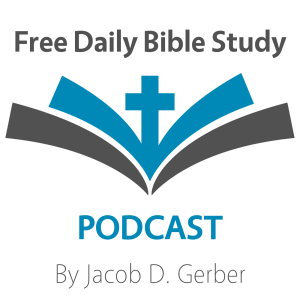
Free Daily Bible Study Podcast
Religion & Spirituality:Christianity

Ruth 3–4 | Acts 28 | Jeremiah 38 | Psalms 11–12
In Ruth 3–4, the other sandal drops. We discover here that there is another, closer kinsman-redeemer to the family of Elimelech who would have priority in choosing to marry Ruth (Ruth 3:12–13) and that redeeming Ruth would put that man’s inheritance at risk (Ruth 4:6). Under the Mosaic law, a surviving brother would marry his dead brother’s widow in a Levirate marriage. When the woman bore a son, that son would be considered the legal heir not of the living brother but of the dead brother (Deut. 25:7), which is exactly what Boaz describes to the other, closer redeemer in Ruth 4:5: “The day that you buy the field from the hand of Naomi, you also acquire Ruth, the Moabite, the widow of the dead, in order to perpetuate the name of the dead in his inheritance.”
The man recognized, however, that marrying Ruth could present some challenges for his own inheritance (Ruth 4:6)—that is, he didn’t think he could afford it for a few reasons. First, this would add more mouths to feed. Second, the man would ultimately lose Mahlon’s field back to any children he had through Ruth. And third, if he provided Ruth’s children an additional inheritance from his own property, the man’s own children would ultimately receive smaller portions. In all, this arrangement would represent a net loss.1
Also, keep in mind that all of this takes place within the tribe of Judah, and as you may recall, one of Judah’s own sons had earlier refused to perpetuate the name of his dead brother through a Levirate marriage in Genesis 38:8–11—perhaps even out of the same kind of concerns. Here again, a son of Judah refuses to perpetuate the name of his dead kinsmen, so he avails himself of the exception provided for in the law of Moses by removing his sandal in the sight of all the people, waiving his right to redeem Ruth (Ruth 4:7–12; cf. Deut. 25:9).
But all of this legal negotiation is the precursor to the real story. When Boaz finally marries Ruth, they have a son named Obed, who becomes the father of Jesse, who later begets a son named David (Ruth 4:17, 22). Don’t forget—the book of Ruth takes place “in the days when the judges ruled” (Ruth 1:1), and the whole point of the book of Judges was to underscore the fact that Israel desperately needed a king (Judg. 21:25).
So at last, through the covenant faith of Ruth, God provides a king in Ruth’s great-grandson David. And ultimately, through the lineage of David, God would send his own Son, Jesus Christ, into the world to reign as our eternal king—not only over the nation of Israel, but also over Gentiles who, like Ruth, may enter the covenant family of God through faith.
1 Robert L. Hubbard, Jr., The Book of Ruth, NICOT (Grand Rapids, MI: Wm. B. Eerdmans, 1988), 245–46.
Scripture quotations are from The Holy Bible, English Standard Version copyright © 2001 by Crossway Bibles, a division of Good News Publishers. Used by permission. All rights reserved.
More Episodes
 2024-10-28
2024-10-28
 2024-10-27
2024-10-27
 2024-10-26
2024-10-26
 2024-10-25
2024-10-25
 2024-10-24
2024-10-24
 2024-10-23
2024-10-23
 2024-10-22
2024-10-22
 2024-10-21
2024-10-21
 2024-10-20
2024-10-20
Create your
podcast in
minutes
- Full-featured podcast site
- Unlimited storage and bandwidth
- Comprehensive podcast stats
- Distribute to Apple Podcasts, Spotify, and more
- Make money with your podcast
It is Free
- Privacy Policy
- Cookie Policy
- Terms of Use
- Consent Preferences
- Copyright © 2015-2024 Podbean.com





